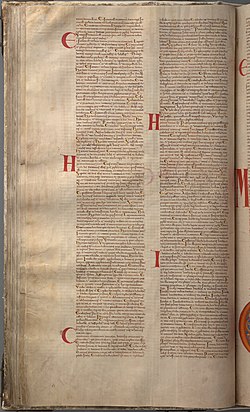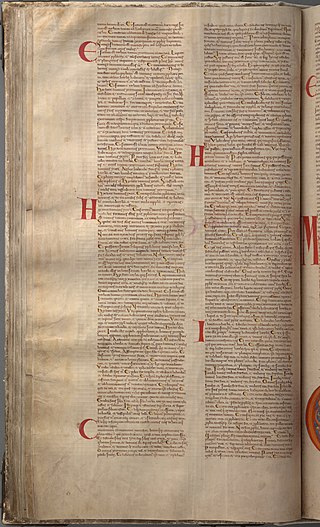Zechariah 13
Bible chapter From Wikipedia, the free encyclopedia
Zechariah 13 is the thirteenth of the 14 chapters in the Book of Zechariah in the Hebrew Bible or the Old Testament of the Christian Bible.[1][2][3] This book contains the prophecies attributed to the prophet Zechariah. In the Hebrew Bible it is part of the Book of the Twelve Minor Prophets.[4] This chapter is a part of a section (so-called "Second Zechariah") consisting of Zechariah 9–14.[5] Verses 1–6 may be seen as continuous with chapter 12,[6] whereas verses 7–9 form a separate "invocation",[7] forming a three-section "entity" with 14:1-21.[8]
| Zechariah 13 | |
|---|---|
 | |
| Book | Book of Zechariah |
| Category | Nevi'im |
| Christian Bible part | Old Testament |
| Order in the Christian part | 38 |
Text
The original text was written in the Hebrew language. This chapter is divided into 9 verses.
Textual witnesses
Some early manuscripts containing the text of this chapter in Hebrew are of the Masoretic Text, which includes the Codex Cairensis (from year 895), the Petersburg Codex of the Prophets (916), Aleppo Codex (930), and Codex Leningradensis (1008).[9][10]
There is also a translation into Koine Greek known as the Septuagint, made in the last few centuries BC. Extant ancient manuscripts of the Septuagint version include Codex Vaticanus (B; B; 4th century), Codex Sinaiticus (S; BHK: S; 4th century), Codex Alexandrinus (A; A; 5th century) and Codex Marchalianus (Q; Q; 6th century).[11]
Idolatry cut off (verses 1–6)
Three proclamations concerning "when that day comes" follow on from six similar proclamations in chapter 12.[12] The phrase "that day" has a range of biblical uses; biblical writer Katrina Larkin suggests that in Zechariah its meaning is eschatological.[13] These verses mark the end of "true prophecy", meaning that any further prophecy would be "false prophecy": Larkin comments that the bracketing together of "the prophets" and "the unclean spirit" in verse 2 is "remarkable".[13] This section clearly alludes to Amos 7:14 concerning the denial of being a prophet by profession (as opposed to by divine call); it may also allude to Deuteronomy 18:20–21 and Jeremiah 23:30–40 about the issue of "distinguishing between true and false prophecy".[14]
The smitten shepherd (verses 7–9)
This section follows the previous one to emphasize that as 'the prophets will be unnecessary, the shepherds will also be unnecessary in the eschatological future, because God himself will take drastic action to restore his people. A connection to Zechariah 11:17 has been suggested due to the common theme of "sword" as well as allusions to Ezekiel 5:1–4 (verse 8) and Hosea 2:23 (verse 9d) are deemed plausible.[14]
Verse 7
- Awake, O sword, against my shepherd,
- and against the man that is my fellow,
- saith the Lord of hosts:
- and against the man that is my fellow,
- smite the shepherd,
- and the sheep shall be scattered:
- and I will turn mine hand upon the little ones.[15]
- and the sheep shall be scattered:
The medieval French rabbi Rashi interprets "shepherd" as "the one whom [God] appointed over the flock of [His] exile".[16] The Christian gospels pick up this verse, stating that Jesus referred to it in anticipating that his disciples would be scattered following his arrest.[17][18][19]
See also
References
Sources
External links
Wikiwand - on
Seamless Wikipedia browsing. On steroids.

